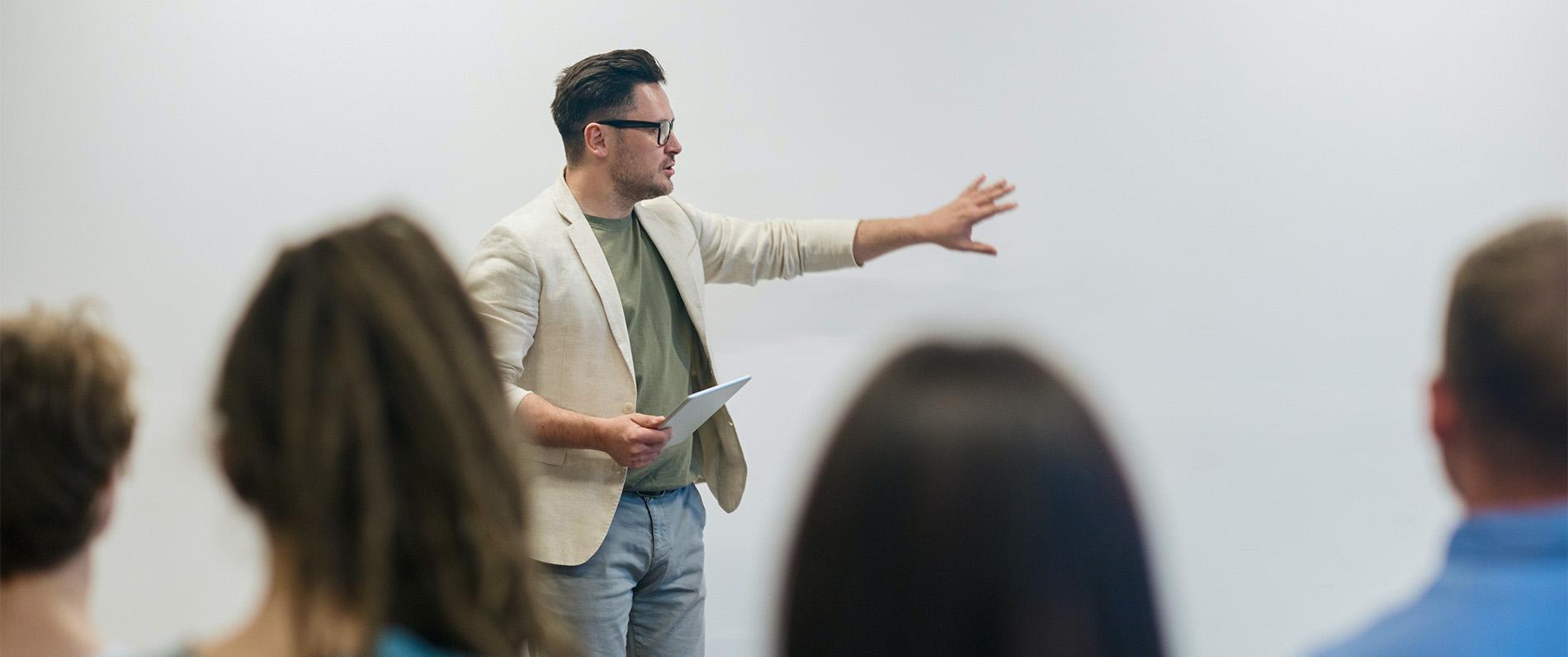In an information-saturated world, Communication makes things clearer.
What you’ll earn
As a broad and rich area of study, Communication Studies can prepare you for a wide array of careers.
Transfer Interest Area
In small classes where you can work closely with your instructors and classmates, you'll practice the principles of communications like public speaking, listening, critical thinking, conflict management, rhetoric, and persuasion. You'll learn about different styles of communications like professional, intercultural, interpersonal, and even environmental to prepare you for a wide array of careers.
WHAT YOU'LL LEARN
- Critical thinking
- Public speaking
- Intercultural communication
- Business and professional communication
- Interpersonal communication
- Rhetoric and writing
AFTER LANE
According to The National Association of Colleges and Employers the "ability to verbally communicate with persons inside and outside the organization" is the number one job skill. At various times sources as diverse as the U.S. Department of Labor, Fortune 500, the Wall Street Journal, and human resource surveys have asserted that oral communication skills help students secure employment and successful job performance.
As you study Communication at Lane, you'll work on your two-year Oregon Arts Transfer Degree (AAOT), which will help you take the classes you need to transfer to a four-year institution to earn your degree and launch your career. Because the AAOT is a transfer degree, you’ll take a wide variety of classes in math, science, arts & letters, and more, preparing you for junior level status at most Oregon four-year schools.
Not sure what a transfer interest area is? Learn more about the types of degrees & certificates Lane has to offer.
The Department of Communication Studies serves all other college departments and prepares students for four-year colleges and universities by providing required and elective courses in a variety of communication fields. Our courses are designed to foster students' appreciation for the centrality and complexity of communication, to build confidence in their ability to communicate effectively, and to promote their sense of responsibility for communicating capably. The ultimate goal of our program is to develop sensitive and adaptable communicators, in sending and in responding to messages.
Course Information
The Communication Studies discipline is not only about public speaking. While our department does offer performance classes, it also offers a variety of theory classes to improve your understanding of how communication works in different contexts, including from the listener's perspective. Check our course descriptions.
Resources
Careers
The National Association of Colleges and Employers ranks as number one the "Ability to verbally communicate with persons inside and outside the organization." One the Institutional Learning Outcomes at Lane Community College is to communicate effectively. At various times sources as diverse as the U.S. Department of Labor, Fortune 500, the Wall Street Journal, and human resource surveys have asserted that oral communication skills help students secure employment and successful job performance. Faculty across disciplines have identified communicating as the first basic competency for every college graduate.
We offer the following links to assist you in enhancing your academic or career goals with studies in Communication.
Completing Communication Studies outside of Oregon
The National Communication Association (NCA) allows you to develop a login and explore its resources. In its discipline data, you can find a list of other community colleges and undergraduate programs in the field of communication
First Year Students
The Communication Studies Department supports the college's desire to place students in appropriate classes, to provide meaningful learning experiences, and to design learning opportunities that lead to proficiency in Lane's Institutional Learning Outcomes, particularly in the core ability of communicating effectively.
First-year students should be aware of the following facts about our curriculum:
- Introduction to Communication is our lowest-numbered, but not necessarily our easiest course. It is a survey of communication theory, and theory can be complex.
- If you are not confident in your basic college skills, such as listening, understanding complex lectures, and note-taking, you might benefit from our Listening and Critical Thinking class.
- If you have difficulty expressing yourself in writing, you should be aware that our communication theory classes require substantial writing. Before registering for these classes, you should consider a basic writing class. Students also can take advantage of free tutoring through Academic and Tutoring Services.
- If you fear public speaking, our performance classes are specifically designed to help you surmount your fears and build confidence. We believe you will profit by conquering (and not avoiding) public speaking in the supportive atmosphere of our classes.
More about Communication Studies
Classical works in Communication fall under the heading of rhetoric, the art of persuasion. The most influential ancient writing was Aristotle's (4th century BC) Ars Rhetorica or The Art of Rhetoric. Many terms used today can be traced to ancient rhetorical classifications of, for instance, figures of speech. Since the ancients, philosophers and educators have carried forward the study of oral communication, as seen in Dr. Gideon Burden's Sylva Rhetoricae.
Beyond rhetoric, the field of communication studies has grown to include areas such as organizational and professional communication, intercultural and interpersonal communication, gender, health, family communication, nonverbal, small group, and sports communication among others. Hundreds of colleges and universities support instruction in the field and educators remain committed to the importance of communication courses to the education of the whole person and to the health of our democratic and culturally diverse society.
Ready to learn more?

Talk one-on-one with a recruiter to learn more about what Lane has to offer you.
4000 East 30th Avenue
Eugene, Oregon 97405
Thursdays, 10:00 am-5:00 pm
Fridays, 8:30 am-2:00 pm, open until 5pm during the week before and first week of each term
LCC is closed on Fridays in the summer







